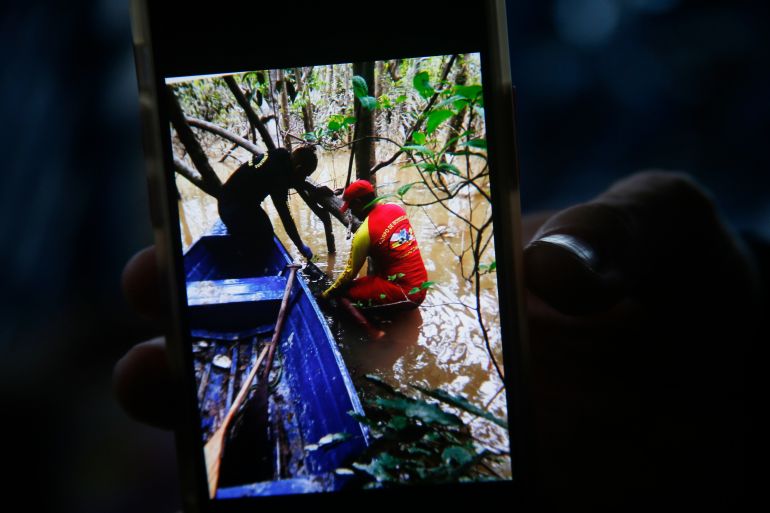Belongings of missing Indigenous expert, reporter found in Amazon
The two were last seen in Brazil’s Javari Valley reserve; police are probing a possible connection to illegal fishing.

The belongings of a missing Indigenous expert and a British journalist have been found submerged in a river in the Brazilian Amazon as authorities have intensified their search and increasingly pursued possible links to illegal fishing.
Police on Sunday said they had identified the items, including a backpack, laptop, clothing and a health card, as the belongings of the missing men – Bruno Pereira, a 41-year-old expert with Brazil’s government agency for Indigenous affairs (Funai), and Dom Phillips, 57, a veteran contributor to The Guardian newspaper who was working on a book on environmental protection.
Keep reading
list of 3 itemsDeforestation in Brazil Amazon rainforest soars 67 percent
Search continues for Indigenous expert, British writer in Brazil
The men were last seen on June 5 near the entrance of the Javari Valley Indigenous territory, which borders Peru and Colombia. They were returning alone by boat on the Itaquai River to the town of Atalaia do Norte but never arrived. They had reportedly received threats during their research trip.
A firefighter told reporters in Atalaia do Norte that the backpack was found tied to a tree and half-submerged.
The discovery on Sunday came after search teams concentrated their efforts around a spot in the Itaquai River where a tarp from a boat the missing men had used was found a day earlier by volunteers from the Matis Indigenous group. It came a day after police reported finding traces of blood in the boat of a fisherman who is under arrest as the only suspect in the disappearance. Officers also found organic matter of apparent human origin in the river, authorities said. The materials are being analysed.
Javari Valley Reserve, Brazil’s second-largest Indigenous territory, has seen violent conflicts in recent years between fishermen, poachers and government agents. The violence has grown as drug trafficking gangs battle for control of waterways to ship cocaine in the reserve, although Itaquai is not a known drug trafficking route.
Illegal fishing
Authorities are probing possible links between the disappearance and an international network that pays poor fishermen to fish illegally in the reserve.
Among the valuable targets living in its waters is the world’s largest freshwater fish, the arapaima, which weighs up to 200kg (440 pounds) and can grow to 3 metres (10 feet). The fish is sold in nearby cities, including Leticia in Colombia, Tabatinga in Brazil, and Iquitos in Peru.
Indigenous witnesses said fisherman Amarildo da Costa de Oliveira had brandished a rifle at Pereira and Phillips a day before they went missing. Authorities say he has since been arrested as a suspect and traces of blood found in his boat were being analysed.
Through his family, Oliveira has told reporters he is innocent and has alleged being tortured by military police.
The discovery of the belongings came as friends and relatives of the missing men held a vigil on a beach in Rio de Janeiro.
“It should serve to raise awareness” about the environmental destruction of the Amazon, Zeca Azevedo, Phillips’s brother-in-law, told the AFP news agency.
“We have to honour their work.”